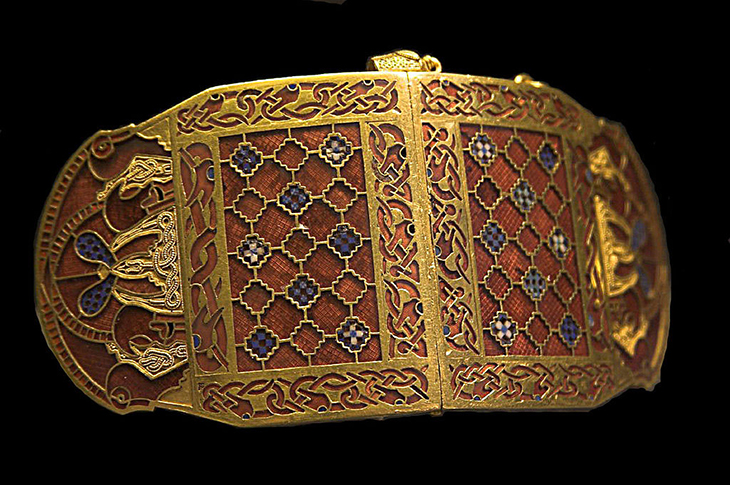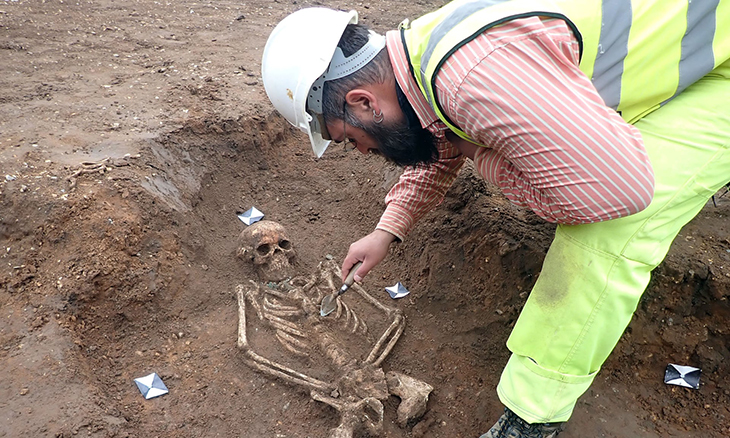The UK government’s recent announcement that STEM (Science, Technology, Engineering, Mathematics) courses and medicine will receive a greater proportion of its Higher Education Teaching Grant is wonderful news for these sectors. It is, however, a major blow for archaeology. With class time, fieldwork and lab work all part of the curriculum, archaeology was originally included among the government’s ‘intermediate cost subjects’ and therefore received a portion of this grant to help cover costs. Now though, re-classified as ‘high-cost non-strategic’, its funding will be cut by 50 per cent. This will have far-reaching consequences for universities’ capacity to teach the subject effectively. There could be fewer places offered on archaeology courses, exacerbating a decline in graduate numbers that began in 2008. Archaeology departments might close or reduce in size. Jobs could be lost. The government justifies its decision by saying that ‘healthcare, STEM and specific labour market needs’ are the ‘priorities of the nation’.
Yet archaeology’s omission from these priorities is surprising, as it plays an ever-present role in daily life. On any given evening, TV documentaries discuss events from British history, often based on the latest archaeological discoveries. The Dig, a movie about the excavation of the Sutton Hoo treasure, is one of Netflix’s current hits. Books on British archaeology continue to be popular. Across the UK, people are proud of the country’s iconic archaeological sites and historic monuments, which attract visitors from across the world. According to a Heritage Lottery Fund report, in 2015, heritage tourism contributed £20.2 billion to the UK’s GDP. Archaeologists play an important role in this success. They constantly add to our knowledge about ancient sites, giving people reasons to revisit them. They discover new sites of interest – the tourist draws of the future. And they unearth artefacts that end up displayed in the country’s museums, among their many other contributions.

An Anglo-Saxon shoulder clasp from the Sutton Hoo ship burial. British Museum. Photo: Rob Roy via Wikimedia Commons (CC BY-SA 2.5)
In 2020, the world’s top four archaeology departments were in the UK. To use one of the prime minister’s favourite phrases, British archaeology is currently ‘world-beating’. A loss of funding risks this position and the sector’s ability to innovate. After all, modern archaeology isn’t just about digging – there are specialisms as diverse as drone mapping, the analysis of biological remains (which can shed light on the ancient development of cancers and diseases), and even space archaeology. All of which sound pretty STEM to me.
Archaeologists are not only needed to excavate ancient sites, but to interpret them and fit them into our wider national story. Through their investigations, we gain an understanding of where we come from, while groups neglected in historical records can be resurrected. Archaeology also has the power to unite people. It has a public benefit. For local communities, time spent visiting excavations and listening to presentations on discoveries can enhance their relationship with the past and add to their pride in the local area. In turn, this benefits the national well-being by illuminating our shared stories and interconnections. You’d think a government run by a Classics graduate would understand the value of studying the past.
Archaeological investigation is also an important part of the planning process. In recent years, the number of archaeologists working in commercial archaeology increased to meet the needs of major infrastructure projects, with archaeologists from the EU comprising 11 per cent of this workforce in 2018–19. The demand for qualified archaeologists remains high, and any drop in EU workers due to Brexit will worsen the skills shortages highlighted by Historic England back in 2016. HS2, intended to ‘transform’ and ‘level-up’ the country, zooms at high speed to nowhere without enough archaeologists. The government’s inclusion of archaeology on its shortage occupations list, which makes it easier for employers to hire non-UK nationals, shows that it recognises this urgent need for archaeological skills even as it cuts grants to universities wanting to teach them.

An early Medieval cemetery discovered recently in Cambridge has been described as ‘one of the most exciting finds of Anglo-Saxon archaeology since the 19th century’. Photo: Albion Archaeology
Diverting funds to STEM courses and medicine might encourage more students to apply for these subjects, particularly if the accessibility and quality of archaeology courses decrease as a result. But isn’t there a danger that we take a generation of potential passionate archaeologists and convince them to become disinterested engineers? As we all know – and as is emphasised during this time of pandemic – the work of doctors and scientists is of critical importance. But we need culture too, particularly to raise spirits in hard times. Drama, music, art and – yes – archaeology all play a part in our mental well-being.
It’s also important to note that many archaeology graduates ultimately take up positions in managing the UK’s historic environment, particularly at Historic England, Historic Environment Scotland and the Church of England. They are the protectors and interpreters of our monuments – cultural guardians whom you’d expect the government to be championing. Without archaeology funding, where will the next generation of these specialists come from? By the time the government recognises archaeologists’ skills as a ‘priority of the nation’, it may already be too late.

The British government thinks archaeology doesn’t matter. It couldn’t be more wrong
Ralph Fiennes as the archaeologist Basil Brown in 'The Dig' (2021). Photo: LARRY HORRICKS/NETFLIX © 2021
Share
The UK government’s recent announcement that STEM (Science, Technology, Engineering, Mathematics) courses and medicine will receive a greater proportion of its Higher Education Teaching Grant is wonderful news for these sectors. It is, however, a major blow for archaeology. With class time, fieldwork and lab work all part of the curriculum, archaeology was originally included among the government’s ‘intermediate cost subjects’ and therefore received a portion of this grant to help cover costs. Now though, re-classified as ‘high-cost non-strategic’, its funding will be cut by 50 per cent. This will have far-reaching consequences for universities’ capacity to teach the subject effectively. There could be fewer places offered on archaeology courses, exacerbating a decline in graduate numbers that began in 2008. Archaeology departments might close or reduce in size. Jobs could be lost. The government justifies its decision by saying that ‘healthcare, STEM and specific labour market needs’ are the ‘priorities of the nation’.
Yet archaeology’s omission from these priorities is surprising, as it plays an ever-present role in daily life. On any given evening, TV documentaries discuss events from British history, often based on the latest archaeological discoveries. The Dig, a movie about the excavation of the Sutton Hoo treasure, is one of Netflix’s current hits. Books on British archaeology continue to be popular. Across the UK, people are proud of the country’s iconic archaeological sites and historic monuments, which attract visitors from across the world. According to a Heritage Lottery Fund report, in 2015, heritage tourism contributed £20.2 billion to the UK’s GDP. Archaeologists play an important role in this success. They constantly add to our knowledge about ancient sites, giving people reasons to revisit them. They discover new sites of interest – the tourist draws of the future. And they unearth artefacts that end up displayed in the country’s museums, among their many other contributions.
An Anglo-Saxon shoulder clasp from the Sutton Hoo ship burial. British Museum. Photo: Rob Roy via Wikimedia Commons (CC BY-SA 2.5)
In 2020, the world’s top four archaeology departments were in the UK. To use one of the prime minister’s favourite phrases, British archaeology is currently ‘world-beating’. A loss of funding risks this position and the sector’s ability to innovate. After all, modern archaeology isn’t just about digging – there are specialisms as diverse as drone mapping, the analysis of biological remains (which can shed light on the ancient development of cancers and diseases), and even space archaeology. All of which sound pretty STEM to me.
Archaeologists are not only needed to excavate ancient sites, but to interpret them and fit them into our wider national story. Through their investigations, we gain an understanding of where we come from, while groups neglected in historical records can be resurrected. Archaeology also has the power to unite people. It has a public benefit. For local communities, time spent visiting excavations and listening to presentations on discoveries can enhance their relationship with the past and add to their pride in the local area. In turn, this benefits the national well-being by illuminating our shared stories and interconnections. You’d think a government run by a Classics graduate would understand the value of studying the past.
Archaeological investigation is also an important part of the planning process. In recent years, the number of archaeologists working in commercial archaeology increased to meet the needs of major infrastructure projects, with archaeologists from the EU comprising 11 per cent of this workforce in 2018–19. The demand for qualified archaeologists remains high, and any drop in EU workers due to Brexit will worsen the skills shortages highlighted by Historic England back in 2016. HS2, intended to ‘transform’ and ‘level-up’ the country, zooms at high speed to nowhere without enough archaeologists. The government’s inclusion of archaeology on its shortage occupations list, which makes it easier for employers to hire non-UK nationals, shows that it recognises this urgent need for archaeological skills even as it cuts grants to universities wanting to teach them.
An early Medieval cemetery discovered recently in Cambridge has been described as ‘one of the most exciting finds of Anglo-Saxon archaeology since the 19th century’. Photo: Albion Archaeology
Diverting funds to STEM courses and medicine might encourage more students to apply for these subjects, particularly if the accessibility and quality of archaeology courses decrease as a result. But isn’t there a danger that we take a generation of potential passionate archaeologists and convince them to become disinterested engineers? As we all know – and as is emphasised during this time of pandemic – the work of doctors and scientists is of critical importance. But we need culture too, particularly to raise spirits in hard times. Drama, music, art and – yes – archaeology all play a part in our mental well-being.
It’s also important to note that many archaeology graduates ultimately take up positions in managing the UK’s historic environment, particularly at Historic England, Historic Environment Scotland and the Church of England. They are the protectors and interpreters of our monuments – cultural guardians whom you’d expect the government to be championing. Without archaeology funding, where will the next generation of these specialists come from? By the time the government recognises archaeologists’ skills as a ‘priority of the nation’, it may already be too late.
Unlimited access from just $16 every 3 months
Subscribe to get unlimited and exclusive access to the top art stories, interviews and exhibition reviews.
Share
Recommended for you
The Dig is a film to treasure
Ralph Fiennes and Carey Mulligan shine in the story of the Sutton Hoo discovery
Who is responsible for heritage in outer space?
A new international agreement raises questions about what counts as cultural property in space, how it should be protected and who should do the protecting
‘X discovered under X’ – the archaeologist’s dream?
A Roman fort has been discovered under a bus station in Exeter… and it’s the stuff that headlines are made of, says Rakewell